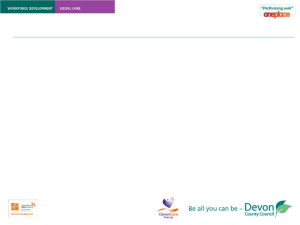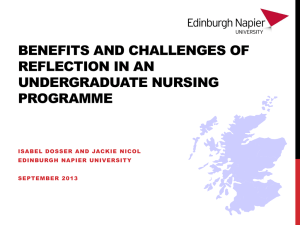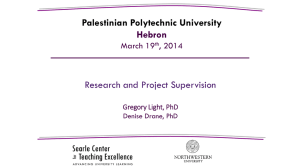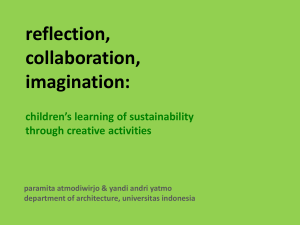Effective Use of Supervision
advertisement
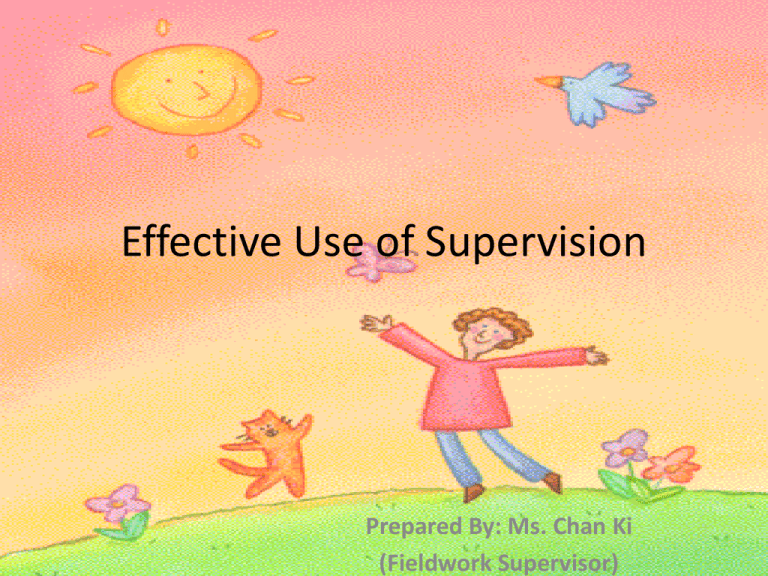
Effective Use of Supervision Prepared By: Ms. Chan Ki (Fieldwork Supervisor) What is Learning ? What Do You Think About the Purpose of Supervision ? Learning is the process… • Transformation of experience through reflection • improve practice through reflection • Learn from the experience and develop knowledge to guide future practice (Tsang , 1998) Supervision is a Forum to Facilitate Learning Through Reflection • The main vehicle for learning is reflection • Reflection may not always come easily • Supervision aims to facilitate student’s reflection so as to deepen their understanding on the practice experience (The multiplicity of practice scenario) Allyson Mary Davys & Liz Beddoe, 2009 The Reflective Learning Model (Allyson Mary Davys & Liz Beddoe, 2009) • Supervision is driven from the experience of learner (The supervisee) rather than from the wisdom and knowledge of the supervisor The students play the active role in their fieldwork learning What is reflection ? Reflection refers to • ‘A conscious bring to the surface of different forms of knowledge while attending to the thoughts and emotion present in the student both in situation and after the experience’ Allyson Mary Davys & Liz Beddoe, 2009 The Reflective Learning Model Allyson Mary Davys & Liz Beddoe, 2009) What’s in the reflection • • • • • • • How the issue has impacted on him/her What meaning this event /experience has in terms of current or previous experience How does he or she feel about the issue How have these feeling be addressed ,accommodated, expressed? How have the feeling affect the practice in hand? What ideas, thoughts, judgments or opinions had about the situation? Are there any pattern to this ideas , thoughts or feeling? The Reflective Learning Model (Allyson Mary Davys & Liz Beddoe, 2009) The developmental stages of supervision Beginning Stage : Preparation for supervision: • Setting of agenda: student’s ownership of his work and the supervision process • to explore the supervision issue: What does the student want from the supervision session? The Reflective Learning Model (Allyson Mary Davys & Liz Beddoe, 2009) The exploration Stage: • The retelling of the story/experience • Re-experience the situation It enable the supervisor to • hear the story from the student’s perspectives • hear where the student emphasis • know where the student omits The Reflective Learning Model (Allyson Mary Davys & Liz Beddoe, 2009) Implications Stage: feedback, reassurance and affirmation • Reflection on thoughts, and feeling may raise question of a more conceptual nature and theory • Reach some decision and understanding about the issue being discussed • Plan for further intervention, solutions The Reflective Learning Model (Allyson Mary Davys & Liz Beddoe, 2009) Experimentation Stage • Integrate the insight into practice or awareness • Move forward with the issue/experience Evaluation Stage • What has the student learned from the reflection and the teaching in the supervision session? • What are the new questions? How they been addressed? What We Learn From the Reflective Learning Model • Reflection is the important part of learning in fieldwork practice • Your practice experience is the most valuable context for your reflection in your fieldwork learning • You own the responsibilities in your fieldwork learning through reflection on the practice experience • Supervision can facilitate your reflection as well as enhancing your learning and development What Can You Do to Maximize Your Reflection and Learning Through Supervision ? YOU Must Make good use of your practice experience as the context for discussion and co-reflection with your supervisor • Let your supervisor know the details of your practice experience • write up the paper work with details description, analysis and reflection -Your supervisor could prepare well for supervision -The discussion and reflection in supervision will be more fruitful You Must • Set your supervision agenda, so your supervisor know what’s your concern and what /where to start the supervision and discussion -The supervision time can be used efficiently You Must Build up trust with your supervisor • Openly disclose your experience (both positive and negative) in supervision. The meaningful reflection could be started from the negative experience (e.g. frustration, mistake, failure ) • Mistake in practice could be a good opportunity for learning and reflection Conflictual Situation ? Ask yourself: • What ? • Why ? • How ? Take action to change the situation as fast as possible ! Conflict will hinder your progress of learning ! You Must • Prepare yourself to get involved in discussion and reflection in the supervision. • Practice more so you can gain more concrete experience for reflection and learning You are the one to decide what you want to learn and how you can learn from your fieldwork practice ! Thank You! Reference • Davys, A. & Beddoe, L. (2009) “The reflective Learning Model: Supervision of social work Students” Social Work Education, Vol. 28 No.8 pp919-933 • Tang, N.M. (1998) “Re-examining reflection – a common issue of professional concern in social work, teacher and nursing education” Journal of Interprofessional Care 12:1, 21-31 • Kolb. D. (1984) Experiential Learning as the Sources of Learning and Development, Prentice Hall, New Jersey.

